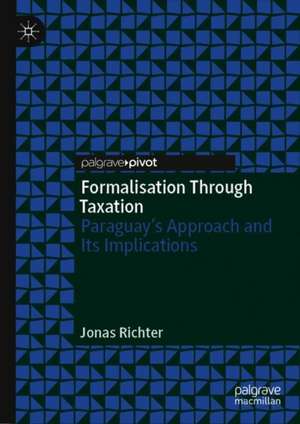Formalisation Through Taxation: Paraguay’s Approach and Its Implications
Autor Jonas Richteren Limba Engleză Hardback – 21 oct 2019
Preț: 383.50 lei
Nou
Puncte Express: 575
Preț estimativ în valută:
73.39€ • 79.69$ • 61.65£
73.39€ • 79.69$ • 61.65£
Carte tipărită la comandă
Livrare economică 23 aprilie-07 mai
Preluare comenzi: 021 569.72.76
Specificații
ISBN-13: 9783030292812
ISBN-10: 3030292819
Pagini: 113
Ilustrații: XIII, 117 p. 9 illus.
Dimensiuni: 148 x 210 mm
Greutate: 0.31 kg
Ediția:1st ed. 2019
Editura: Springer International Publishing
Colecția Palgrave Pivot
Locul publicării:Cham, Switzerland
ISBN-10: 3030292819
Pagini: 113
Ilustrații: XIII, 117 p. 9 illus.
Dimensiuni: 148 x 210 mm
Greutate: 0.31 kg
Ediția:1st ed. 2019
Editura: Springer International Publishing
Colecția Palgrave Pivot
Locul publicării:Cham, Switzerland
Cuprins
1. Introduction.- 2. Literature Review.- 3. Research Methodology.- 4. The Evolution of the Paraguayan Tax System.- 5. A Formalising Economy.- 6. Political Consequences.- 7. Discussion and Conclusion.
Notă biografică
Jonas Richter holds an MPhil in Development Studies from Oxford University, UK and a BA in Economics and Business Studies from the University of Stirling. He has since worked at the World Bank. His research interest encompasses firm development, informality, tax-regimes and productive inclusion.
Textul de pe ultima copertă
In developing countries, such as Paraguay, informality remains a prevalent and persistent issue. Many avoid formal registration with the authorities and evade tax payments. However, a growing academic literature argues for an interrelation between a broader tax base and a country’s economic and democratic development. A strand of this literature focuses on the means of taxing the informal sector and argues for positive revenue and growth effects. This Palgrave Pivot analyses Paraguay’s 2004 and 2012 tax reforms using both qualitative and quantitative data. It illustrates that the country’s personal income tax, as well as other alterations in the tax system, constitute an incentive and nudging mechanism that leads to a formalisation process of economic activity, and consequently to a broader tax base. Using interview and tax data, the book demonstrates how the reform initiates a rising demand of formalised purchases from both customers and businesses. It further suggests a potential wayof how the taxpayers respond politically to the enhanced fiscal imperative.
Caracteristici
Studies the initial impact of consumer-driven business formalization in Paraguay, the first of its kind in the developing world Offers new insight into a one-of-a-kind tax policy experiment as a vehicle to reduce informality Derives from interviews with market participants, bureaucrats, current and former leading politicians, and experts in Paraguay
